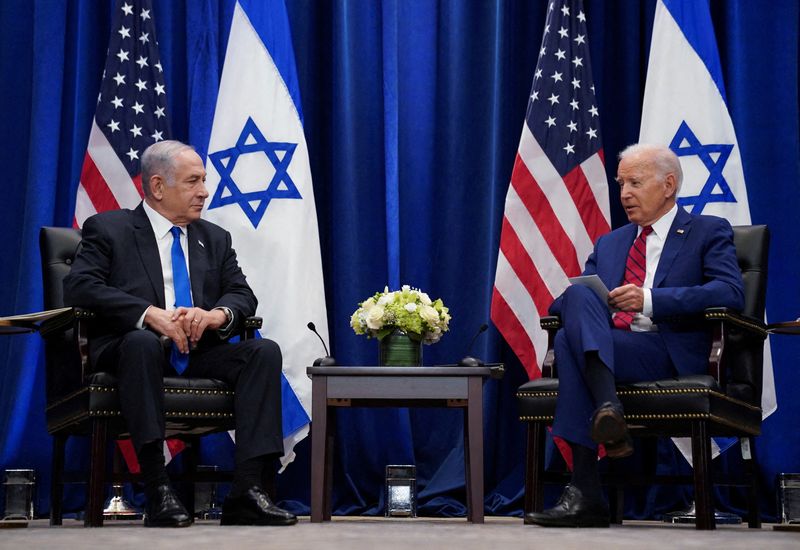By Trevor Hunnicutt, Jarrett Renshaw and Humeyra Pamuk
WASHINGTON/TEL AVIV (Reuters) -U.S. President Joe Biden's White House is wrestling with thorny security and political challenges as officials consider a potential trip to Israel that may hold longer-term diplomatic advantages for Biden.
Prime Minister Benjamin Netanyahu invited Biden, who has been outspoken in his support for Israel, Washington's closest Middle East ally, still reeling after a devastating cross-border assault by Palestinian Hamas militants on Oct. 7 in which 1,300 Israelis were killed.
The White House declined to comment on any planning for the trip. National Security Council spokesperson Adrienne Watson said in a statement that "we have no new travel to announce." A source said on Sunday that U.S. and Israelis officials were discussing the possibility of a visit soon.
Such a trip would be a rare and risky choice, showing American backing for Netanyahu as the U.S. tries to avert a broader regional war involving Iran, its Lebanese ally Hezbollah and Syria, and as food and fuel run low in Gaza, where authorities say more than 2,800 people have been killed in Israeli attacks.
A visit would, however, grant Biden fresh leverage to influence events on the ground and bolster his image at home.
Biden and Netanyahu, uncomfortable allies in the best of times, have joined forces despite being at odds over the path forward in the Middle East with Biden frequently stressing support for independent Israeli and Palestinian states.
A meeting in person would allow Biden to privately discuss concerns and possible red lines in a looming Israeli ground invasion of Gaza.
"Biden needs to look Netanyahu in the eye and make sure he understands that America's global reputation is at stake and an occupation of Gaza will drag both countries into a protracted conflict," said Kirsten Fontenrose, a former U.S. national security official who is now a fellow at the Atlantic Council.
Highlighting the unique security risks facing a Biden trip, U.S. Secretary of State Antony Blinken, in Israel for meetings, was forced to take shelter in a bunker for five minutes with Netanyahu when sirens went off in Tel Aviv during their meeting.
Israel is planning a ground offensive in Gaza expected to intensify the humanitarian crisis there, missiles have been exchanged between Lebanon and Israel and Israelis throughout the country continue to take shelter from Hamas-fired missiles.
Other Western leaders including German Chancellor Olaf Scholz and lawmakers are planning similar Israel visits this week, as are members of Congress. U.S. presidents rarely visit allies shortly after the outbreak of conflict, typically leaving the job to a senior diplomat or defense official.
"Presidential visits try to be tightly choreographed and wars are never tightly choreographed," said Jon Alterman, a senior vice president at the Center for Strategic and International Studies.
SUPPORT FOR GAZA RESIDENTS?
Biden on Monday talked by phone with foreign leaders and condemned a 36% rise in anti-Jewish hate crimes, but made no public appearances. He canceled a trip to Colorado.
Some 30 protesters including some American Jews were arrested outside the White House as they called for a humanitarian ceasefire in Gaza, the Secret Service said.
Some 78% of Americans, including majorities of both Democrats and Republicans, support U.S. diplomatic efforts to allow Gaza residents fleeing the fighting to move to a safe country, according to a Reuters/Ipsos poll. Forty-one percent of respondents said they agreed with a statement that "the U.S. should support Israel" in its conflict with Hamas, while just 2% said the U.S. should support the Palestinians.
In recent days, the Democratic president has tried to thread a needle by publicly lending unconditional support for Israel's response to Hamas attacks while showing humanitarian concern for Palestinians in Israeli-bombarded Gaza.
Biden thinks that for him to effectively influence Israel, officials there need "to feel you are in it with them and understand their anger and pain," Alterman said.

Biden could pair the visit with a meeting with Palestinian Authority President Mahmoud Abbas in the West Bank, as he did on the sidelines of his one prior visit to Israel as president last year, said Alon Pinkas, a longtime foreign policy adviser in Israel who served former Israeli prime minister Ehud Barak.
Biden has visited Israel 10 times, first as a senator in 1973, before the Yom Kippur War involving Israel, Egypt and Syria. Several presidents have visited dating back to Richard Nixon in 1974.